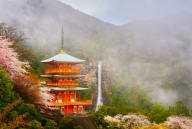-
- 简体中文
- 繁體中文(香港)
- 繁體中文(臺灣)
- India (English)
- Bahasa Indonesia
- 한국어
- ภาษาไทย
- Tiếng Việt
- Singapore (English)
- Philippines (English)
- Malaysia (English)
- Australia/New Zealand (English)
- Français
- Deutsch
- Italiano
- Español
- United Kingdom (English)
- Nordic countries(English)
- Canada (English)
- Canada (Français)
- United States (English)
- Mexico (español)
- Português
- العربية
- Japan(日本語)
- Global (English)
-
Destinations
-
Things to Do
-
Plan Your Trip
-
Articles
- JAPAN Monthly Web Magazine
- Tradition
- Arts & Cultures
- Cuisine
- Nature & Outdoor
- Shopping
- Relaxation
- Festivals & Events
- All
- Insider Blog
- Things to do
- Local Guides
- Outdoor
- Food & drink
- City life
- Culture
- Traditional
- Adventure
- Consumer
- All
Use the
Planning a Trip to Japan?
Share your travel photos with us by hashtagging your images with #visitjapanjp
Leading Sustainable Destinations in Japan
Green Destinations “Top 100 Destination Sustainability Stories”
Green Destinations, the world’s leading destinations’ network for responsible tourism, selects regions that meet its core criteria and have advanced sustainability stories through a panel of experts each year. These are published as the “Top 100 Destination Sustainability Stories” to be shared as inspiring examples to tourism professionals and travelers.Six regions from Japan were selected in 2020 and 12 regions in 2021, the largest number of regions by country in 2021. 10 regions from Japan were selected in 2022 and 10 regions were selected in 2023.

|
2020
Kamaishi | Kyoto City | Miura Peninsula | Niseko Town | Okinawa Prefecture | Shirakawa Village

|
2021
Amami-Oshima Island | Aso City | Kamaishi | Kyoto City | Nagara River Basin | Nanao City and Nakanoto Town | Nasushiobara City | Niseko Town | Sado City | Shodoshima Town | Toyooka City | Yoron Island

|
2022
Shodoshima Town | Ozu City | Oguni Town | Nasushiobara City | Minamichita Town | Kamaishi | Higashimatsushima City | Hakone Town | Gero-spa Town | Aso City

|
2023
Kamaishi | Ozu City | Oguni Town | Hakone | Yoron Island | Teshikaga Town | Obuse Town | Miyazu City | Marugame City | Miyoshi City
“Best Tourism Villages by UNWTO”
In 2021, the World Tourism Organization (UNWTO) launched “Best Tourism Villages by UNWTO,” a global initiative to highlight the villages that are working to make tourism a driver of rural development and wellbeing and to advance the role of tourism in valuing and safeguarding rural villages along with their associated landscapes, knowledge systems, biological and cultural diversity, local values and activities. In 2023, a total of 190 regions participated and villages from 54 regions worldwide were selected as “Best Tourism Villages.” The following 4 villages were selected from Japan.

|
|
2021
|
|
2023
|
Japan Tourism Agency “JSTS-D (Japan Sustainable Tourism Standard for Destinations)”
The "JSTS-D" provides sustainable tourism indicators for municipalities and DMOs so that they understand the current situation from various angles and manage tourism sustainably.
The indicators are based on international standards outlined in the Global Sustainable Tourism Criteria for Destinations (GSTC-D). Each element of the various JSTS-D tourism indicators is organized in consideration of Japan and its unique characteristics and challenges. The following destinations have committed to working under the JSTS-D.

|
As of November 29, 2023
Otaru City
Yatsugatake Area
(Hokuto City, Fujimi Town, Hara Village)
Miura Peninsula
(Kamakura City, Zushi City, Yokosuka City, Miura City, Hayama Town)
Kyoto City
Kamaishi City
Shikoku
(Ehime Prefecture, Kagawa Prefecture, Kochi Prefecture, Tokushima Prefecture)
Higashimatsushima City
Aso City
Akita Prefecture
(Odate City, Kitaakita City, Kosaka Town, Kamikoani Village)
Hata Area
(Sukumo City, Tosashimizu City, Shimanto City, Otsuki Town,
Mihara Village, Kuroshio Town)
Hatsukaichi City
Amami-Oshima Island
Ozu City
Tonosho Town
Atami City
Imabari City
Furano City
Sumida Ward
Niseko Town
Nasushiobara City
Meiwa Town
Gifu Prefecture
Marugame City
Chichibu City
Abiko City
Ome City
Teshikaga Town
Kitakyushu City, Shimonoseki City
Tono City
- Home
- Sustainable
- Leading Sustainable Destinations in Japan




























































